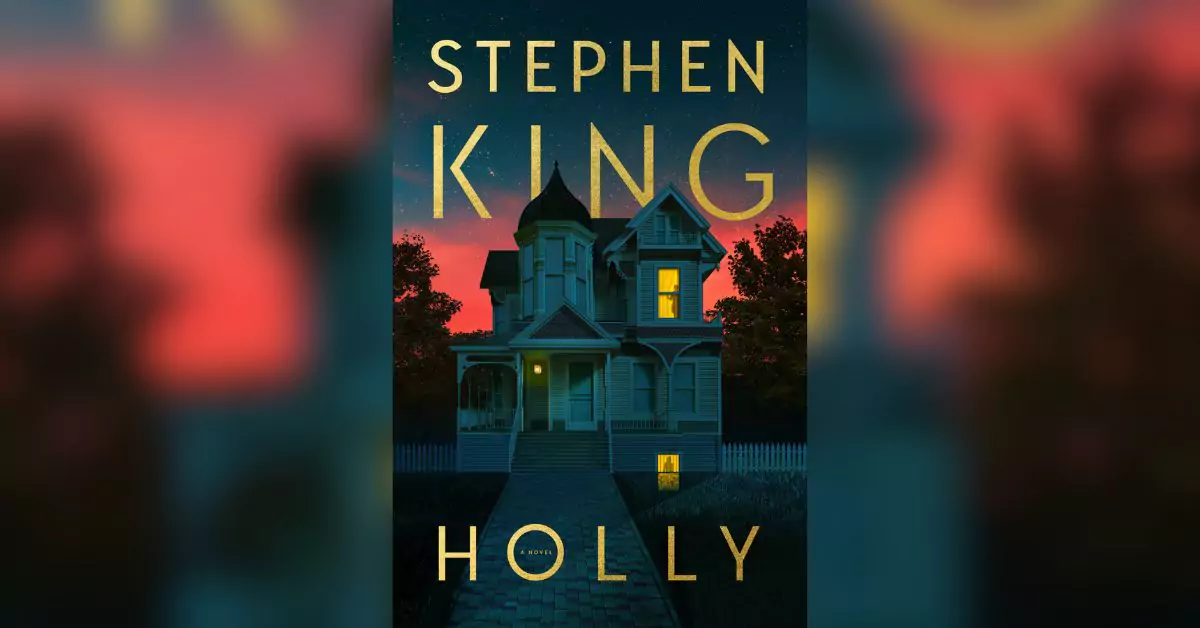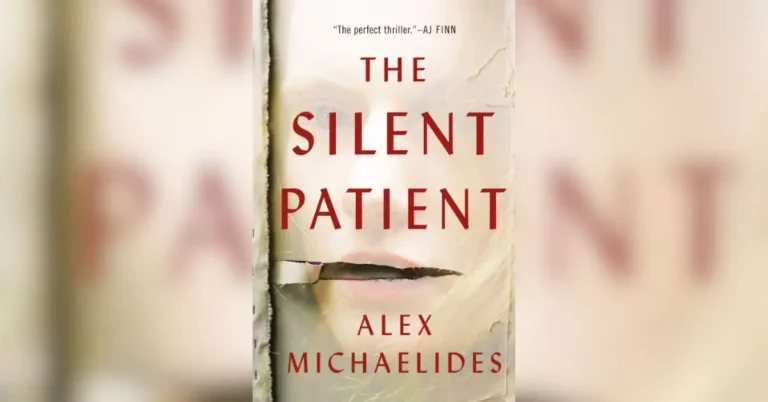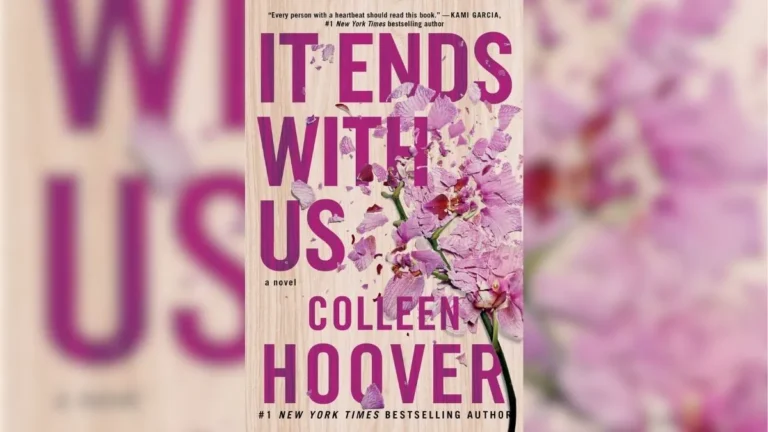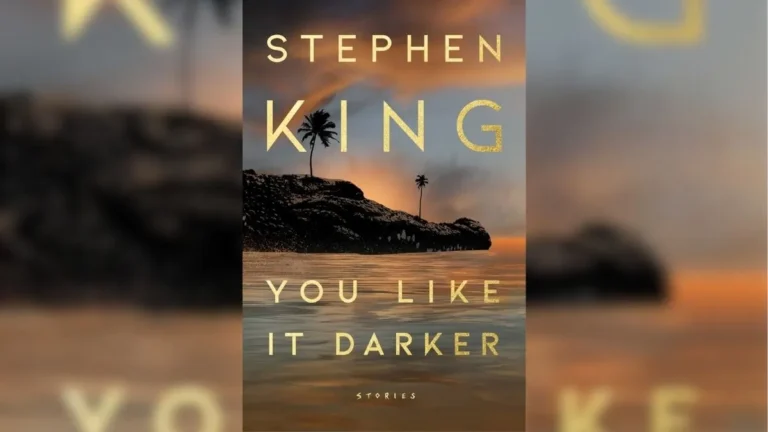Introduction
Stephen King’s Holly isn’t just another thriller—it’s a testament to the power of character evolution. If you’ve followed Holly Gibney’s journey from the Mr. Mercedes trilogy to The Outsider, you know she’s not your typical protagonist. She’s quirky, introverted, and deeply empathetic. But in Holly, King pushes her further into the spotlight, giving us a story that’s both intimate and terrifying.
At its core, Holly is a crime thriller wrapped in horror. The novel is set against the backdrop of the COVID-19 pandemic—a time when isolation, fear, and uncertainty were at an all-time high. That alone sets a haunting tone. But King doesn’t stop there. He introduces us to villains that are so ordinary, so unassuming, that it makes their evil all the more disturbing. It’s this mix of the mundane and the monstrous that gives Holly its unique flavor.
For those familiar with Holly from previous books, this novel feels like coming home—only to find that home has been invaded by something dark and twisted. King doesn’t just give us a mystery to solve; he gives us a character who is grappling with her own demons while trying to uncover the truth behind a series of disappearances. It’s personal for Holly, and that makes it personal for us.
This isn’t just a whodunit. It’s an exploration of grief, resilience, and what it means to face evil head-on when you’re already carrying the weight of your own pain. King masterfully blends crime-solving with emotional depth, creating a story that keeps you on edge while tugging at your heartstrings.
So, if you’re expecting just another detective story, think again. Holly is about more than solving a mystery—it’s about confronting the darkness within ourselves and others. And trust me, once you dive in, you won’t be able to look away.
Plot Summary
Let’s talk about Holly Gibney for a moment. When we first met her in Mr. Mercedes, she was shy, socially awkward, and struggling with anxiety. Over time—through Finders Keepers, End of Watch, and The Outsider—we watched her grow into a confident investigator with an uncanny ability to see things others miss. But in Holly, we see her at her most vulnerable yet most determined.
The story kicks off with Penny Dahl reaching out to Holly for help finding her missing daughter. At first glance, it seems like just another missing person case—tragic but straightforward. But this is Stephen King we’re talking about, so nothing is ever as simple as it seems.
Enter Rodney and Emily Harris: an elderly couple who appear harmless on the surface but hide something far more sinister beneath their polite exteriors. They’re not your typical villains—they’re professors, intellectuals even—but their evil lurks in their banality. They’ve mastered the art of blending into society while committing unspeakable acts behind closed doors.
As Holly digs deeper into the case, she’s also dealing with her own personal grief—the recent death of her mother during the pandemic weighs heavily on her mind. This isn’t just another job for Holly; it’s a way for her to channel her pain into something productive, something meaningful.
But here’s where King really shines: he doesn’t just give us a straightforward detective story where clues lead neatly from one point to another. No, Holly’s investigation takes twists and turns that are as psychological as they are procedural. She has to navigate not only the external dangers posed by Rodney and Emily but also her internal struggles—her loneliness, her grief, and her fear of failure.
In true King fashion, the tension builds slowly but surely until it reaches a crescendo that leaves you breathless. Every clue Holly uncovers brings her closer to the truth—and closer to danger.
By the end of Holly, you’re not just rooting for her to solve the case; you’re rooting for her to heal, to find some semblance of peace in a world that often feels anything but peaceful.
Themes Explored
In Holly, Stephen King doesn’t just give us a mystery to solve—he gives us a mirror. A mirror that reflects our own struggles, our own grief, and the resilience we often don’t realize we have until we’re tested. Let’s break down the key themes that make this novel more than just a thriller.
Grief
Grief is a constant companion for Holly in this story. The death of her mother during the pandemic isn’t just a plot point; it’s the emotional undercurrent that shapes every decision she makes. We’ve all experienced loss in some form, but Holly’s grief is raw, unfiltered. It’s not just about missing someone—it’s about the guilt, the “what ifs,” and the overwhelming sense of helplessness. As she dives deeper into Penny Dahl’s case, it becomes clear that solving this mystery is Holly’s way of coping. She can’t save her mother, but maybe—just maybe—she can save someone else. And isn’t that what we all do? We channel our pain into something productive, hoping it will heal us along the way.
Resilience
Holly isn’t your typical hero. She’s not fearless or invincible. She’s human—flawed, anxious, and often unsure of herself. But what makes her special is her resilience. Despite everything she’s been through, she keeps going. She doesn’t give up when the odds are stacked against her. In fact, it’s her vulnerability that makes her strong. King shows us that resilience isn’t about being tough all the time; it’s about getting back up even when you don’t want to. Holly’s determination to uncover the truth, even when it puts her in danger, is a testament to the quiet strength we all carry within us.
Moral Complexity
The villains in Holly aren’t your typical monsters. Rodney and Emily Harris are elderly intellectuals who seem harmless at first glance. But as we get to know them, we realize that evil doesn’t always wear a mask—it can look like your next-door neighbor or your college professor. King blurs the lines between good and evil in a way that forces us to question our own moral compass. How can people who seem so ordinary commit such horrific acts? And more importantly, how do we stop them without becoming monsters ourselves? This moral complexity adds depth to the story, making us uncomfortable in all the right ways.
Pandemic Setting
The COVID-19 pandemic looms large over Holly. It’s not just a backdrop—it shapes the characters and their actions. The isolation, fear, and uncertainty of living through a global crisis are palpable throughout the novel. For Holly, the pandemic represents both loss and opportunity—a chance to reflect on what really matters but also a reminder of how fragile life can be. King uses the pandemic to heighten the tension and create a sense of claustrophobia that mirrors Holly’s internal struggles. It’s a bold move that grounds the story in reality while still delivering the suspense and horror we’ve come to expect from him.
Notable Quotes
Stephen King has always had a knack for delivering lines that stick with you long after you’ve closed the book. In Holly, there are moments where his words cut deep—whether they’re offering hope or chilling you to your core.
“Sometimes the universe throws you a rope.”
– Bill Hodges
This quote is like a lifeline for Holly—and for us as readers. Life is hard; we all know that. But sometimes, when things seem darkest, something—or someone—comes along to help pull us out of that darkness. For Holly, Bill Hodges was that rope in earlier stories, and now she has to become her own rope in this one. It’s a reminder that even when we feel alone or overwhelmed, there’s always something worth holding onto if we look hard enough.
“Destroying the itch brings relief. Doesn’t it?”
– Villain’s reflection
This line is disturbing because it gives us a glimpse into how twisted minds justify their actions. The villain here isn’t just doing evil for evil’s sake—they’re rationalizing it as necessary relief from an unbearable itch. It’s chilling because it forces us to confront how easy it can be for people to dehumanize others when they’re focused solely on their own needs or desires. This quote lingers because it taps into something primal: our need for relief from discomfort—even if that relief comes at someone else’s expense.
King has always excelled at giving voice to both heroes and villains in ways that feel real—and these quotes are prime examples of how he uses language not just to tell a story but to make us think about ourselves and our world in new ways.
Character Analysis
Holly Gibney: From Sidekick to Star
Holly Gibney has always been the underdog. When we first met her in Mr. Mercedes, she was a secondary character—quirky, socially awkward, and battling anxiety. She wasn’t the hero; she wasn’t even supposed to be in the spotlight. But over time, Stephen King saw something in her that we all came to love: resilience, empathy, and an uncanny ability to see things others miss.
In Holly, she’s no longer playing second fiddle. She’s the lead, and it’s about time. What’s fascinating about Holly is that she doesn’t fit the mold of your typical protagonist. She’s not fearless or brimming with confidence. Instead, she’s deeply human—flawed, vulnerable, and often unsure of herself. And yet, it’s precisely these qualities that make her so relatable. She’s a reminder that you don’t have to be perfect to be brave.
Throughout the novel, Holly grapples with personal grief—her mother’s death during the pandemic weighs heavily on her—and yet she pushes forward. Her growth isn’t about becoming invincible; it’s about learning to carry her pain while still doing what needs to be done. She’s not just solving a mystery; she’s navigating her own emotional landscape, and that makes her journey all the more compelling.
Rodney and Emily Harris: Ordinary Monsters
Rodney and Emily Harris are terrifying precisely because they’re so ordinary. They’re not supernatural beings or serial killers lurking in the shadows—they’re an elderly couple who seem harmless at first glance. And that’s what makes them so unsettling.
King has always been a master at crafting villains who are disturbingly real, and Rodney and Emily are no exception. They’re intellectuals, professors even, who hide their monstrous nature behind polite smiles and academic credentials. What makes them truly terrifying is their banality—the idea that evil can exist in the most mundane places, behind the most unassuming faces.
Their actions are horrifying, but what’s even more chilling is how easily they justify their behavior. They don’t see themselves as villains; they see themselves as people doing what needs to be done. It forces us to confront a disturbing truth: sometimes, evil doesn’t announce itself with fanfare—it blends in.
Supporting Characters: Jerome and Barbara Robinson
Jerome and Barbara Robinson play crucial roles in Holly’s journey. They’re not just sidekicks—they’re her anchors in a world that often feels overwhelming. Jerome, with his tech-savvy skills and unwavering loyalty, provides Holly with both practical help and emotional support. He believes in her when she doesn’t believe in herself.
Barbara Robinson adds another layer of complexity to Holly’s life. She challenges Holly to step out of her comfort zone, pushing her to confront not only the case but also her own fears and insecurities. Together, Jerome and Barbara aren’t just supporting characters—they’re catalysts for Holly’s growth.
Writing Style
Dual Timelines: Building Suspense
Stephen King knows how to keep you on edge, and one of his favorite tools is the use of dual timelines. In Holly, he masterfully weaves together past and present, creating a sense of suspense that builds slowly but surely. It’s like watching two trains hurtling toward each other—you know they’re going to collide eventually, but you don’t know when or how.
By giving us glimpses into Rodney and Emily Harris’ past while simultaneously following Holly’s present-day investigation, King creates a tension that keeps you turning pages long after you should have gone to bed. The dual timelines allow us to see the full scope of the horror unfolding while keeping Holly (and us) in the dark until just the right moment.
Balancing Horror and Detective Work
What makes Holly so compelling is how King balances horror with detective work. On one hand, you have a classic mystery—a missing person case that needs solving. On the other hand, you have elements of horror that creep in slowly but surely: the unsettling behavior of Rodney and Emily Harris, the claustrophobic atmosphere of their home, the growing sense of dread as Holly gets closer to uncovering their secrets.
King doesn’t rely on jump scares or gore to create fear—instead, he uses psychological tension and moral ambiguity to keep us on edge. The horror isn’t just in what happens; it’s in what could happen at any moment.
Integrating Real-World Events: COVID-19
One of the boldest choices King makes in Holly is setting it during the COVID-19 pandemic. It would have been easy for him to ignore real-world events and focus solely on fiction—but instead, he weaves the pandemic into the fabric of the story itself.
The pandemic isn’t just a backdrop; it shapes everything from Holly’s personal grief (her mother died from COVID) to the way characters interact with each other (masks, social distancing). It adds an extra layer of tension because it reminds us that even in times of global crisis, evil doesn’t take a day off.
But King excels here: he integrates these real-world events without letting them overshadow the story itself. The pandemic is ever-present but never distracting—it enhances the sense of isolation and fear permeating every page.
In Holly, King shows us that sometimes fiction can feel more real than reality itself—and that’s what makes his writing so powerful.
Recommendation: Should You Read Holly?
So, should you read Holly? Let’s break it down.
If you’re a fan of psychological thrillers that dig deep into the minds of their characters, then Holly is absolutely worth your time. This isn’t just a story about solving a crime; it’s about navigating grief, finding resilience, and confronting the darkness that hides in plain sight. Holly Gibney, as a character, has evolved so much over the years, and if you’ve followed her journey from Mr. Mercedes to The Outsider, this book feels like the natural next step. It’s satisfying to see her come into her own, not just as an investigator but as a person dealing with her own emotional baggage.
But here’s the thing—this book isn’t for everyone. If you’re sensitive to political themes or pandemic references, you might find parts of Holly uncomfortable. King doesn’t shy away from weaving real-world issues into his narrative. The COVID-19 pandemic is a constant presence in the background, shaping both the plot and the characters’ interactions. For some readers, this adds depth and realism to the story; for others, it might hit too close to home.
And then there’s the moral complexity of the villains. Rodney and Emily Harris aren’t your typical bad guys—they’re disturbingly ordinary, which makes their actions all the more unsettling. If you prefer your villains more black-and-white, this might not be your cup of tea. But if you enjoy stories where good and evil blur together in uncomfortable ways, then Holly will keep you hooked.
In short: if you’re looking for a thriller that challenges you emotionally and intellectually, Holly delivers. But if you’re hoping for pure escapism without any references to our current reality, this might not be the right pick for you at the moment.
Conclusion
When we talk about Stephen King’s vast bibliography, it’s easy to get lost in the sheer volume of his work. But Holly stands out—not just because it’s part of a beloved series. This novel is special because it blends crime-solving with deep emotional undertones. It’s not just about catching the bad guys (though there are plenty of twists and turns on that front); it’s about what happens when ordinary people are forced to confront extraordinary evil—and how they cope with their demons along the way.
King has always been a master at crafting complex characters, but in Holly, he takes it further by giving us a protagonist who feels deeply human. Holly Gibney isn’t perfect—far from it—but that makes her so compelling. She’s flawed, anxious, and grieving, yet she pushes forward because she knows that sometimes doing what’s right means facing your fears head-on.
What really sets Holly apart is its ability to make us think—not just about the mystery at hand but about ourselves. How do we deal with grief? How do we find resilience in times of crisis? And perhaps most importantly: how do we confront evil when it looks so much like us?
For longtime fans of King, this novel is a must-read because it offers satisfying character development for Holly while introducing new layers of horror through disturbingly ordinary villains. For newcomers, Holly serves as both an entry point into King’s world and a standalone thriller that delivers on all fronts—suspense, emotion, and moral complexity.
In the end, Holly isn’t just another thriller—it’s a reflection of our own struggles and triumphs in a world that often feels overwhelming. And that’s why it deserves a place among King’s best work.
Book Recommendations
Here are 5 books that capture the psychological depth and character-driven suspense that makes Holly compelling:
The Silent Patient by Alex Michaelides
Like Holly’s methodical investigation, this psychological thriller peels back layers of truth through a complex protagonist. The story of a woman who shoots her husband and never speaks again will grip readers who appreciate Holly’s deep character study and slow-burning suspense.
Sharp Objects by Gillian Flynn
For those captivated by Holly’s exploration of seemingly ordinary evil, Flynn’s debut novel delivers similar psychological complexity. The story follows a reporter investigating murders in her hometown, dealing with personal demons while uncovering disturbing truths – much like Holly’s journey through grief and investigation.
The Seven and a Half Deaths of Evelyn Hardcastle by Stuart Turton
This innovative mystery will appeal to readers who enjoy Holly’s meticulous detective work. The protagonist must solve a murder while reliving the same day through different perspectives, offering the same kind of layered narrative complexity that makes Holly engaging.
The Thursday Murder Club by Richard Osman
If you appreciate how Holly blends serious themes with moments of levity, this book hits similar notes. A group of retirement home residents solve cold cases, combining clever investigation with deep character work and pandemic-era reflections on mortality.
When These Mountains Burn by David Joy
Joy’s novel delivers similar emotional depth for those drawn to Holly’s exploration of ordinary people facing extraordinary circumstances. Set against the backdrop of the opioid crisis, it examines how regular people navigate moral complexity and personal loss – themes that resonate strongly with Holly’s narrative.
Each of these books shares Holly’s core strength: they’re not just about solving mysteries, they’re about the human condition. They prove that the best thrillers aren’t just about what happens next – they’re about what happens within.



